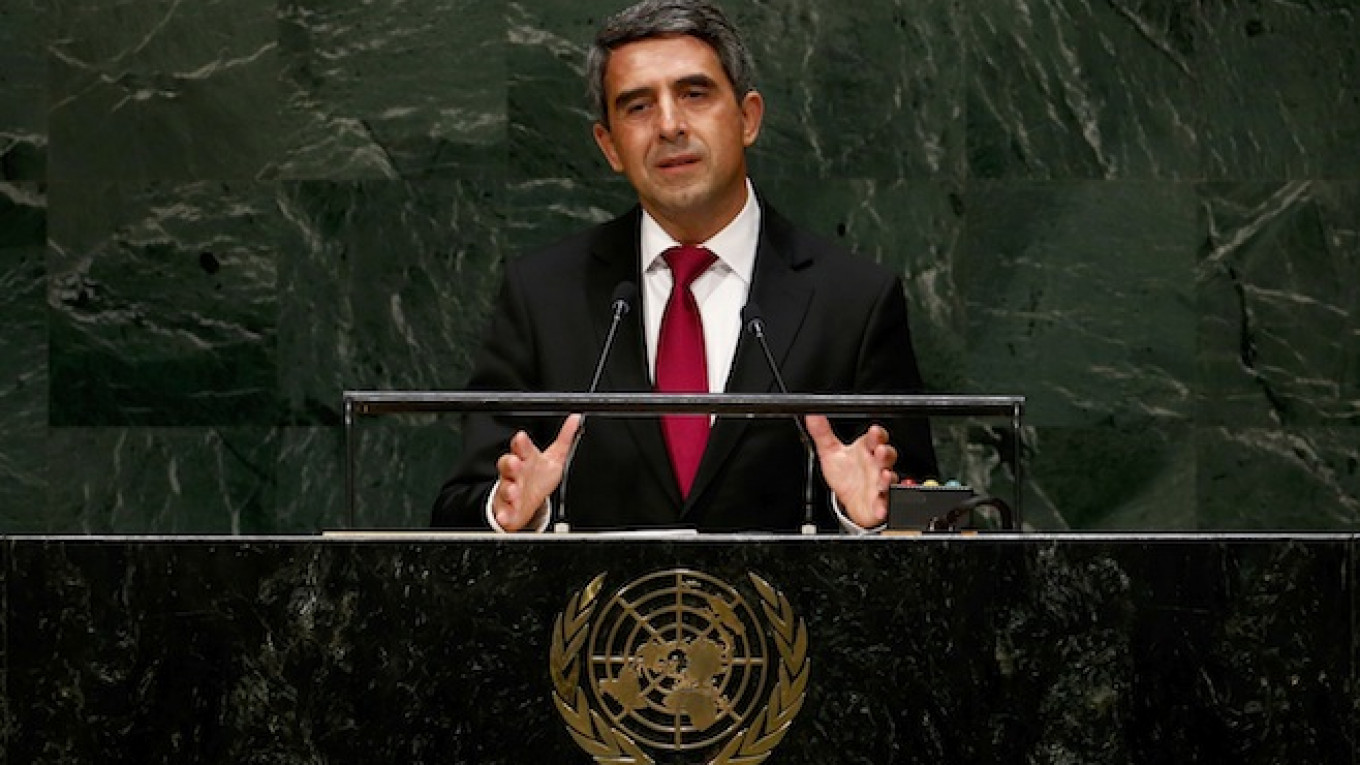Bulgaria's military plans to stop using three dozen of its Russian-made fighter jets and bombers to reassert its independence from Moscow, the defense minister said, following the Bulgarian president's denouncement of Russia as a "nationalist, aggressive state."
The plan to get rid of all Russian-made aircraft is part of Bulgaria's military development program through 2020 to further integrate the former Soviet bloc nation into the Western NATO defense alliance, of which it is a member, Bulgaria's Trud newspaper reported Monday.
The military will present to parliament within six months a list of new airplanes to replace the 15 Russian-made MiG-29 and six MiG-21 fighters and 14 SU-25 bombers that remain in Bulgaria's air force, the report said.
The plan, which Defense Minister Velizar Shalamanov described as a bid to strengthen Bulgaria's independence from Russia, is expected to go ahead despite protests by pilots and maintenance workers who expect the replacement of aircraft to cost 300 jobs, Trud reported.
Russia's annexation of Crimea and its meddling in eastern Ukraine has prompted a series of moves from eastern European nations to boost their ties with NATO and strengthen defense against their former Moscow masters.
Poland's legendary Solidarity Movement leader, Nobel Peace Prize laureate and former President Lech Walesa urged NATO to station nuclear missiles in Poland to deter a potential Russian threat in an interview with Italy's La Stampa published Monday.
"Putin is irresponsible and wants to sow havoc in Poland, as he did in Ukraine," Walesa was quoted as saying. "So we want NATO to give us the best missiles at its disposal, install them here and point them in the right direction."
In Bulgaria, President Rosen Plevneliev said in an interview with Germany's Frankfurter Allgemeine published over the weekend that "Russia must learn to have partners, not vassals and subjects."
"We all want as a partner a country that has produced Tchaikovsky, Tolstoy and Dostoevsky," Plevneliev was quoted as saying. "But facts show that today we have to deal with another Russia — with a nationalist, aggressive state under a president who does not regard Europe as a partner, but as an opponent."
A recent survey by Russia's independent Levada Center pollster has indicated that years of President Vladimir Putin's rule have caused Russians to abandon their wish for a European future for their country.
Despite harsh anti-Western rhetoric by Russia's state-run television channels, the number of Russians who wanted their country at some point to join the European Union had remained in a comfortable majority during the initial decade of Putin's government, but went into a nosedive a few years ago and hit an all-time low of 16 percent last month, according to Levada Center polls.
Bulgaria's president told Frankfurter Allgemeine that "all Europeans have won with the fall of the Berlin Wall, gaining freedom, democracy, perspective."
"However, Vladimir Putin sees the fall of the Wall and the collapse of the Soviet Union as a catastrophe, which leads to his interpretation of history that opposes Europe and its values as a matter of principle," Plevneliev was quoted as saying.
Contact the author at bizreporter@imedia.ru
A Message from The Moscow Times:
Dear readers,
We are facing unprecedented challenges. Russia's Prosecutor General's Office has designated The Moscow Times as an "undesirable" organization, criminalizing our work and putting our staff at risk of prosecution. This follows our earlier unjust labeling as a "foreign agent."
These actions are direct attempts to silence independent journalism in Russia. The authorities claim our work "discredits the decisions of the Russian leadership." We see things differently: we strive to provide accurate, unbiased reporting on Russia.
We, the journalists of The Moscow Times, refuse to be silenced. But to continue our work, we need your help.
Your support, no matter how small, makes a world of difference. If you can, please support us monthly starting from just $2. It's quick to set up, and every contribution makes a significant impact.
By supporting The Moscow Times, you're defending open, independent journalism in the face of repression. Thank you for standing with us.
Remind me later.


